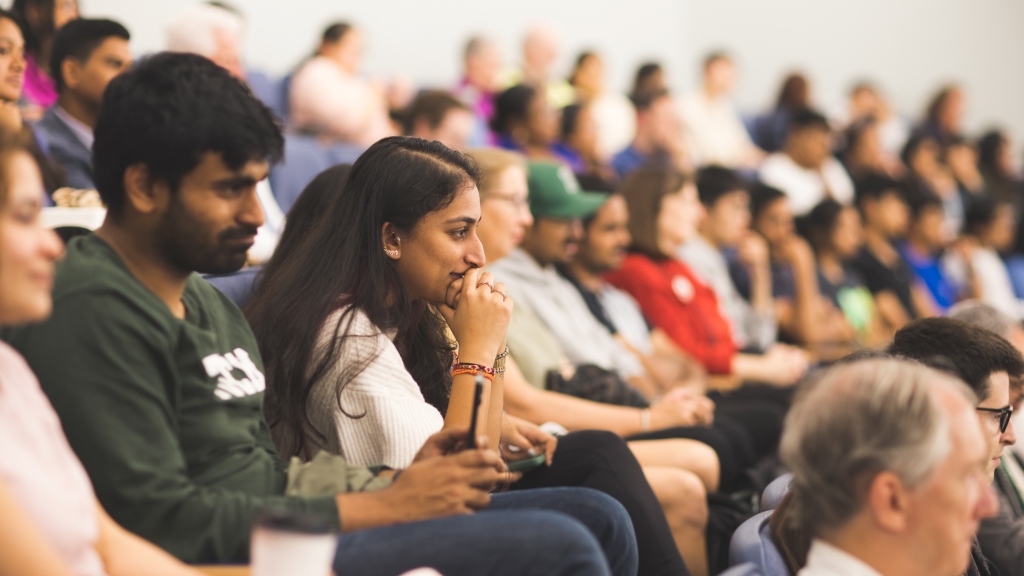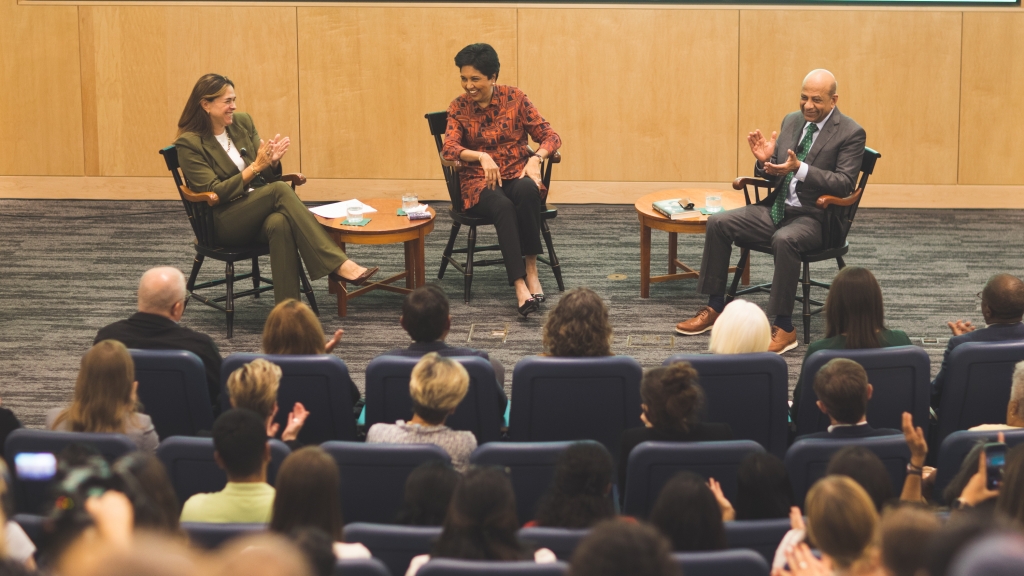What are the building blocks of visionary leadership, and how can women—whatever their background—reach the highest rungs on corporate and academic ladders?
On Wednesday evening, President Sian Leah Beilock and trailblazing former PepsiCo CEO and bestselling author Indra Nooyi explored those and other timely questions about leadership in a fireside chat-style conversation in Cook Auditorium that was also livestreamed.
Their candid exchange of ideas, the first of three days of events marking Beilock's inauguration on Friday as Dartmouth's 19th president, was moderated by Vijay Govindarajan, the Coxe Distinguished Professor of Business at the Tuck School for Business, who has written widely about strategy and innovation in the global economy.
When he asked what can be done to increase the number of women, still less than 10%, who serve as Fortune 500 CEOs or in other major leadership roles, Nooyi had a ready reply, only half-tongue-in-cheek.
"Do you really want to know the answer? I'd say educate the men," Nooyi said, drawing applause from the approximately 260 people watching the discussion.
"I think if you really want the best talent to rise to the top, you've got to have everybody say we want to evaluate talent for talent's sake, and not look at gender, background and ethnicity. And I think the group that really has to accept the fact that life may not be the same boys club that it used to be are the men."

(Photo by Katie Lenhart)
So began a witty exchange of ideas between two women from opposite sides of the globe who nevertheless found common ground. Both, for example, were raised by parents who believed opportunity should be gender-neutral.
"When I was in the third grade, I wanted to play soccer with my friends, who were all boys, and I wasn't allowed to play on the boys' team," Beilock recalled. "And we were signing up in the gym and I remember my mom, who's a lawyer, went up and said, 'What do you mean she can't play on the team? What rules are there in place?' And I got to play with the boys. I watched someone make this really passionate and good argument, and I thought, wow, you can actually change things and systems."
Nooyi also grew up in an equal-opportunity household. Unlike most young girls from southern India, she played cricket and joined a rock band.
"So I grew up confident, and my grandfather suggested I go into debating. All of that gave me a solid foundation to feel comfortable about myself," she said.
But despite the support of mostly male mentors, Nooyi did experience setbacks. Soon after she took the reins of PepsiCo, she bowed to pressure to reverse a decision to launch a charitable initiative. She said she learned from painful experience that "doing the right thing" must also involve pragmatism.
Beilock, a cognitive scientist who specializes in performance under pressure, agreed that failure can be converted to success by re-framing the experience. "It's a way to think about not just dwelling on what went wrong, but what you might change in the future. And you go from this situation where you're just focusing on the negative aspects to having a sense of control about what you would do differently," she said.
Among the challenges facing both the corporate and academic spheres is the rapid rise of artificial intelligence, said Govindarajan. "You're on the board of Amazon," he told Nooyi. "So you have a front row seat on how technologies are disrupting so many industries. Tell me, at the intersection of technology and business, what are the big innovation opportunities?"
"Six or nine months ago, this whole of generative AI, nobody talked about it," Nooyi said. "That's all we're talking about right now. But the thing we can't do is continue teaching the way we used to teach and ignore that technological change is happening around us. We have to now start to figure out how to teach people how to interact with technology."
"I see us as collaborating with the technology," Beilock said. "And I think it underscores the importance of a Dartmouth education, where we're teaching students how to think, not what to think."
Answering questions from the audience, Beilock spoke about other priorities as well, including "centering well-being and health across the institution" and creating "brave spaces" in which people may air differing viewpoints without fear of reprisal.

About 260 people watched the discussion, and several students and other attendees asked questions about leadership and other matters. (Photo By Katie Lenhart)
But in the corporate world, said Nooyi, where "a whole company works toward one mission," employees should "park divisive opinions at the door."
On the other hand, she said, it's crucial to hold fast to your moral compass. Responding to a question about cultural identity from Manasvini Ranganathan, who is pursuing a masters of public health degree at the Geisel School of Medicine, Nooyi said she has remained a vegetarian and nondrinker, even in a corporate culture where those are exceptions to the rule.
Wrapping up the lively discussion, Govindarajan asked Beilock to fast forward in her imagination to 2050. "The New York Times is going to write a story about your tenure. What do you want that story to say?"
"I don’t have it all worked out, but if I have to say one thing I would want people to know that Dartmouth is an engine of impact. It's a place where discoveries go to impact and we better the human condition," said Beilock. "I would like to be known as a president who helped make that clear, helped speed up the process, and really built the leaders of tomorrow."
Inauguration activities continue on Thursday with an academic panel on Driving Impact Through Dartmouth's Innovation Ecosystem.
They culminate on Friday with a community cookout before the Inauguration ceremony on the Green at 3 p.m.
